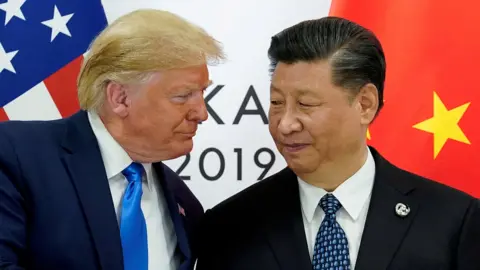**Trump Confirms Upcoming Visit to China Following Positive Dialogue with Xi Jinping**
Recently, former President Donald Trump made headlines by announcing his intent to visit China following a cordial phone call with Chinese President Xi Jinping. The announcement comes amidst ongoing trade tensions that have characterized US-China relations for several years. Notably, this is the first time the two leaders have communicated since Trump initiated a trade war by imposing tariffs on Chinese goods earlier in the year. The call, noted to be initiated by the White House, has been described as “very good” and productive from Trump’s standpoint, leading him to extend an invitation for Xi to visit the White House as well.
The exchange, which lasted for an hour and a half, reportedly focused primarily on trade matters. Trump expressed optimism about the discussions, claiming they led to a “positive conclusion for both countries.” This upbeat assessment contrasts sharply with the critical nature of their past interactions, marked by accusations and retaliatory tariffs. As reported by Chinese state media, the dialogue represents a significant thawing of relations, at least on a surface level, as both nations look to navigate their complex trade dynamics.
During a meeting in the Oval Office with German Chancellor Friedrich Merz, Trump elaborated on his invitation to China. He emphasized the mutual understanding that both leaders had accepted the idea of visits, stating, “I will be going there with the first lady at a certain point and he will be coming here hopefully with the first lady of China.” However, Chinese media did not corroborate Trump’s account of reciprocal invitations, reflecting the cautious approach typically adopted by Beijing in diplomatic negotiations.
The background to the phone call includes existing tensions due to conflicting narratives about compliance with trade agreements struck earlier. Since the US implemented tariffs on a variety of goods, China has retaliated with its own levies, leading to a tit-for-tat that has frustrated both parties. The purported consensus reached in a prior agreement negotiated in Geneva aimed to reduce tariffs, but subsequent accusations from both sides regarding violations have resulted in mounting skepticism.
Xi Jinping’s communication with Trump also conveyed critical feedback about US policies, particularly concerning Taiwan. In a statement released in conjunction with the phone call, Xi urged Trump to handle Taiwan-related matters with “caution” to prevent escalation. This warning gains additional weight in the context of recent comments made by US Defense Secretary Pete Hegseth, who identified China as an “imminent” threat to Taiwan, emphasizing military preparations that could potentially alter the operational integrity of the region.
Amidst this backdrop, Trump’s earlier comments about Xi illustrate the conundrum of US-China negotiations. Despite often admiring Xi’s leadership style, he has described the Chinese leader as “very tough” and “extremely hard to make a deal with.” This dilemma underscores the disparity in negotiation styles between the two nations, where Trump’s preference for direct engagement clashes with the methodical and bureaucratic approach favored by Chinese officials. The latter often involves extensive planning and choreography to ensure that state interactions align with national interests and diplomatic protocols.
This forthcoming visit, if materialized, could represent either a significant step toward improving bilateral relations or merely a superficial alleviation of tensions. The complexities underpinning US-China relations are not confined to trade; they encompass intricate geopolitical dynamics, especially concerning issues like Taiwan and regional security. As both countries confront these multifaceted challenges, the forthcoming dialogues could pave the way for formulating strategies that could either bridge their divides or deepen their conflicts.
In conclusion, Trump’s confirmation of a potential trip to China reflects a pivotal moment in US-China relations, filled with opportunities for dialogue and cooperation, yet also fraught with the potential for misunderstanding and discord. The world will be closely observing how this situation unfolds, as both nations navigate a path marked by significant stakes on both sides.



